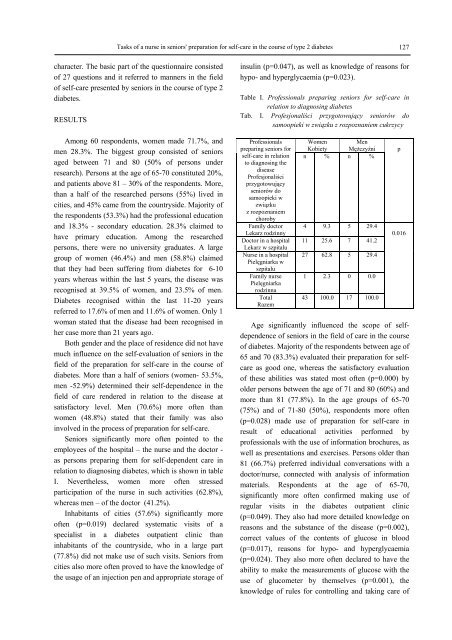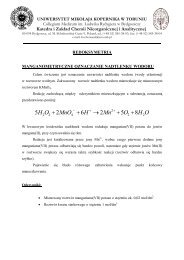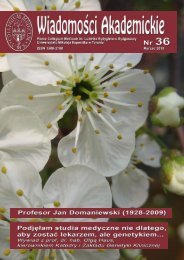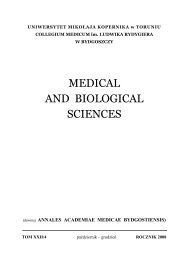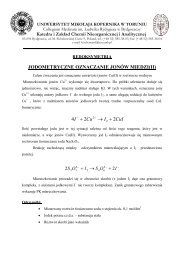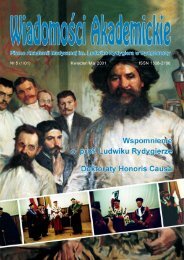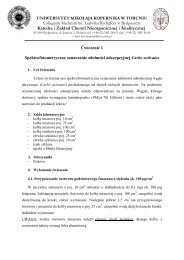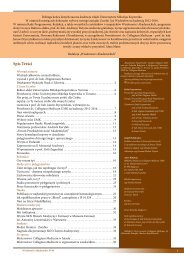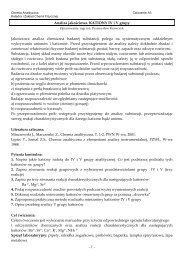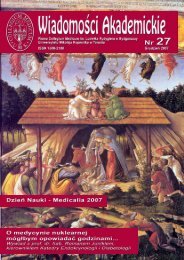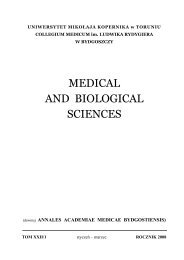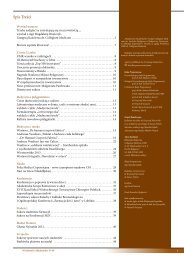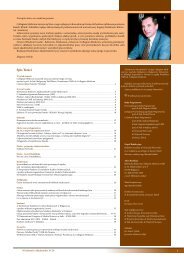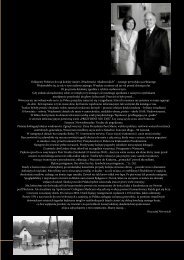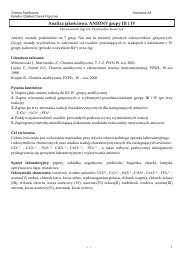126Beata Haor et. al.INTRODUCTIONDiabetes is a metabolic disorder known as early asin the ancient times [1]. At present, it is among bothsocial <strong>and</strong> civilisation diseases. It refers to people of allraces, on all continents <strong>and</strong> it can appear at any age. Inthe last decades of the 20 th century <strong>and</strong> in thebeginning of 21century, a systematic increase innumber of new cases was registered. It has beenassumed that there are about 150 million peoplesuffering from diabetes in the world now. According toinformation from WHO, till 2025 the number ofpatients will have increased even to 380 millions. It isclosely related to the fact that the society is growingolder, obese, used to sedentary lifestyle <strong>and</strong> incorrectdietary habits [2,10]. Age makes an important factor ofthe risk of diabetes. Development peak of type 2diabetes is observed about the age of 60. In theresearchers’ opinion, per cent of patients in apopulation of people older than 65 oscillates between20% <strong>and</strong> 40% [3].In Pol<strong>and</strong>, there are about 2 million peoplesuffering from diabetes, which makes about 5% of thepopulation [4]. In addition, about 10% of thepopulation, i.e. nearly 4 million people suffer fromimpaired glucose tolerance, whereas in older people,type 2 of the disease appears in every fifth or sixthperson. In Europe, diabetes appears in about 10-30% ofthe population in old age. Treatment of the disease <strong>and</strong>its complications makes one of the main problems ofhealth care in medical, as well as social <strong>and</strong> economicrespect [4,5].In spite of huge progress in therapy, at the time being,diabetes is still an incurable disease. The key forsuccess in therapy of this disease is diabetes education.Educating patients in the field of self-care <strong>and</strong>engagement in the process of curing makes the mostimportant part of the therapy [5]. According torecommendations of the Polish Diabetes Association,therapeutic education in regard to adult persons withdiabetes shall be realised during each visit [6]. Effectsof that therapy depend mainly on the completeengagement of the patient <strong>and</strong> his attitude toward thedisease. Within the course of the disease, the care isrendered by inter-disciplinary team of professionals.Specific tasks refer to the nurse, who, due to the fact offrequent contacts with the patient, plays a crucial rolein preparation of the patient for self-control <strong>and</strong> selfcare.Educating patients who suffer from diabetesimposes on her a duty of having substantial knowledgeof the subject. For that reason, she should take care ofher own professional development in order to gain orimprove her abilities in the field of preparing patientswith diabetes for care in the course of the disease. It isimportant to recognise the scope of deficiency of selfcarein a person under her care <strong>and</strong> prepare that personfor self-control <strong>and</strong> self-care by motivating them toacting for the benefit of one’s own health. Education ismainly aiming at e.g. preparation of the patient forimplementation of an appropriate diet <strong>and</strong> physicalactivity, evaluation of one’s own health throughobservation, measurements, registering <strong>and</strong>interpretation of results [5,7]. Contents <strong>and</strong> a form ofhealth education shall be adjusted to both gender, age,<strong>and</strong> education of the patient [2]. Important informationshall be conveyed many times <strong>and</strong> verified during eachmeeting [7]. Also the family or curators of the patientshall be involved in educational program, especially incase of elder persons, which are not fully able tocontrol themselves at all times, [2,7].The survey aims at analysing tasks of nurses inpreparation of seniors with diabetes for self-care in thecontext of present manners which they present in thecourse of the disease.MATERIALS AND METHODSThe research was conducted in 2011 on a group of60 persons at the age ≥65, hospitalised in theDepartment of Internal Diseases of the Self-DependentPublic Heath Care Institution in Człuchów on a basisof a previous consent of the respondents <strong>and</strong> Directorof the above-mentioned institution, as well as theCommittee of Bioethics, of the <strong>Collegium</strong> <strong>Medicum</strong> inBydgoszcz. In the statistical analysis it was checked ifthere are any differences or correlations betweenseniors’ manners in the field of self-care in the courseof diabetes, <strong>and</strong> such socio-demographic variables, asgender, age, place of residence <strong>and</strong> education ofpatients under research. Comparing two independenttests (with regard to gender <strong>and</strong> place of residence ofthe respondents), Mann-Whitney U test was applied.When analysing results of the test in reference to theage <strong>and</strong> education of seniors, Spearman’s rankcorrelation test was used. The statistically significantresults of the performed tests were those of co-efficientp
Tasks of a nurse in seniors' preparation for self-care in the course of type 2 diabetes 127character. The basic part of the questionnaire consistedof 27 questions <strong>and</strong> it referred to manners in the fieldof self-care presented by seniors in the course of type 2diabetes.RESULTSAmong 60 respondents, women made 71.7%, <strong>and</strong>men 28.3%. The biggest group consisted of seniorsaged between 71 <strong>and</strong> 80 (50% of persons underresearch). Persons at the age of 65-70 constituted 20%,<strong>and</strong> patients above 81 – 30% of the respondents. More,than a half of the researched persons (55%) lived incities, <strong>and</strong> 45% came from the countryside. Majority ofthe respondents (53.3%) had the professional education<strong>and</strong> 18.3% - secondary education. 28.3% claimed tohave primary education. Among the researchedpersons, there were no university graduates. A largegroup of women (46.4%) <strong>and</strong> men (58.8%) claimedthat they had been suffering from diabetes for 6-10years whereas within the last 5 years, the disease wasrecognised at 39.5% of women, <strong>and</strong> 23.5% of men.Diabetes recognised within the last 11-20 yearsreferred to 17.6% of men <strong>and</strong> 11.6% of women. Only 1woman stated that the disease had been recognised inher case more than 21 years ago.Both gender <strong>and</strong> the place of residence did not havemuch influence on the self-evaluation of seniors in thefield of the preparation for self-care in the course ofdiabetes. More than a half of seniors (women- 53.5%,men -52.9%) determined their self-dependence in thefield of care rendered in relation to the disease atsatisfactory level. Men (70.6%) more often thanwomen (48.8%) stated that their family was alsoinvolved in the process of preparation for self-care.Seniors significantly more often pointed to theemployees of the hospital – the nurse <strong>and</strong> the doctor -as persons preparing them for self-dependent care inrelation to diagnosing diabetes, which is shown in tableI. Nevertheless, women more often stressedparticipation of the nurse in such activities (62.8%),whereas men – of the doctor (41.2%).Inhabitants of cities (57.6%) significantly moreoften (p=0.019) declared systematic visits of aspecialist in a diabetes outpatient clinic thaninhabitants of the countryside, who in a large part(77.8%) did not make use of such visits. Seniors fromcities also more often proved to have the knowledge ofthe usage of an injection pen <strong>and</strong> appropriate storage ofinsulin (p=0.047), as well as knowledge of reasons forhypo- <strong>and</strong> hyperglycaemia (p=0.023).Table I. Professionals preparing seniors for self-care inrelation to diagnosing diabetesTab. I. Profesjonaliści przygotowujący seniorów dosamoopieki w związku z rozpoznaniem cukrzycyProfessionalspreparing seniors forself-care in relationto diagnosing thediseaseProfesjonaliściprzygotowującyseniorów dosamoopieki wzwiązkuz rozpoznaniemchorobyFamily doctorLekarz rodzinnyDoctor in a hospitalLekarz w szpitaluNurse in a hospitalPielęgniarka wszpitaluFamily nursePielęgniarkarodzinnaTotalRazemWomenKobietyMenMężczyźnin % n %4 9.3 5 29.411 25.6 7 41.227 62.8 5 29.41 2.3 0 0.043 100.0 17 100.0p0.016Age significantly influenced the scope of selfdependenceof seniors in the field of care in the courseof diabetes. Majority of the respondents between age of65 <strong>and</strong> 70 (83.3%) evaluated their preparation for selfcareas good one, whereas the satisfactory evaluationof these abilities was stated most often (p=0.000) byolder persons between the age of 71 <strong>and</strong> 80 (60%) <strong>and</strong>more than 81 (77.8%). In the age groups of 65-70(75%) <strong>and</strong> of 71-80 (50%), respondents more often(p=0.028) made use of preparation for self-care inresult of educational activities performed byprofessionals with the use of information brochures, aswell as presentations <strong>and</strong> exercises. Persons older than81 (66.7%) preferred individual conversations with adoctor/nurse, connected with analysis of informationmaterials. Respondents at the age of 65-70,significantly more often confirmed making use ofregular visits in the diabetes outpatient clinic(p=0.049). They also had more detailed knowledge onreasons <strong>and</strong> the substance of the disease (p=0.002),correct values of the contents of glucose in blood(p=0.017), reasons for hypo- <strong>and</strong> hyperglycaemia(p=0.024). They also more often declared to have theability to make the measurements of glucose with theuse of glucometer by themselves (p=0.001), theknowledge of rules for controlling <strong>and</strong> taking care of
- Page 5 and 6:
Medical and Biological Sciences, 20
- Page 7 and 8:
Treatment and rehabilitation of pat
- Page 9:
Treatment and rehabilitation of pat
- Page 12 and 13:
12Małgorzata Dabkowska et. al.INTR
- Page 14 and 15:
14Małgorzata Dabkowska et. al.of y
- Page 16 and 17:
16Małgorzata Dabkowska et. al.of m
- Page 19 and 20:
Medical and Biological Sciences, 20
- Page 21 and 22:
Morphological parameters of physica
- Page 23 and 24:
Morphological parameters of physica
- Page 25:
Morphological parameters of physica
- Page 28 and 29:
28INTRODUCTIONMariusz KlimczykMETHO
- Page 30 and 31:
30Mariusz KlimczykComparing the bod
- Page 32 and 33:
32Mariusz KlimczykTable 4. Values o
- Page 35 and 36:
Medical and Biological Sciences, 20
- Page 37 and 38:
Assesment of the needs and expectat
- Page 39 and 40:
Assesment of the needs and expectat
- Page 41:
Assesment of the needs and expectat
- Page 44 and 45:
44Małgorzata Łukowicz et. al.Stre
- Page 46 and 47:
46Małgorzata Łukowicz et. al.of l
- Page 48 and 49:
48Małgorzata Łukowicz et. al.fact
- Page 51 and 52:
Medical and Biological Sciences, 20
- Page 53 and 54:
Tuberous sclerosis, late diagnosis:
- Page 55:
Selected articles presented duringt
- Page 58 and 59:
Medical and Biological Sciences, 20
- Page 60 and 61:
Medical and Biological Sciences, 20
- Page 62 and 63:
62Ewa Barczykowska et. al.jakości
- Page 64 and 65:
64Ewa Barczykowska et. al.2. Genera
- Page 66 and 67:
66Ewa Barczykowska et. al.points we
- Page 69 and 70:
Medical and Biological Sciences, 20
- Page 71 and 72:
Independent midwifery practice in P
- Page 73 and 74:
Independent midwifery practice in P
- Page 75 and 76: Independent midwifery practice in P
- Page 77 and 78: Medical and Biological Sciences, 20
- Page 79 and 80: Does the character of hypertension
- Page 81 and 82: Does the character of hypertension
- Page 83: Does the character of hypertension
- Page 86 and 87: 86Kamila Faleńczyk et. al.zmodyfik
- Page 88 and 89: 88Kamila Faleńczyk et. al.wards, i
- Page 90 and 91: 90Kamila Faleńczyk et. al.The deta
- Page 93 and 94: Medical and Biological Sciences, 20
- Page 95 and 96: The influence of external, internal
- Page 97 and 98: The influence of external, internal
- Page 99 and 100: Medical and Biological Sciences, 20
- Page 101 and 102: Quality of life in children with ep
- Page 103 and 104: Quality of life in children with ep
- Page 105: Quality of life in children with ep
- Page 108 and 109: 108Grażyna Franek et. al.W y n i k
- Page 110 and 111: 110Grażyna Franek et. al.factors o
- Page 113 and 114: Medical and Biological Sciences, 20
- Page 115 and 116: Determination of ECP concentration
- Page 117 and 118: Determination of ECP concentration
- Page 119 and 120: Medical and Biological Sciences, 20
- Page 121 and 122: The quality of life of patients ove
- Page 123: The quality of life of patients ove
- Page 128 and 129: 128Beata Haor et. al.the condition
- Page 130 and 131: 130Beata Haor et. al.the course of
- Page 133 and 134: Medical and Biological Sciences, 20
- Page 135 and 136: Quality of life among women with ge
- Page 137 and 138: Quality of life among women with ge
- Page 139 and 140: Medical and Biological Sciences, 20
- Page 141 and 142: Breast cancer prevention as a part
- Page 143 and 144: Medical and Biological Sciences, 20
- Page 145 and 146: The functional efficiency in elderl
- Page 147 and 148: The functional efficiency in elderl
- Page 149 and 150: Medical and Biological Sciences, 20
- Page 151 and 152: The knowledge of nurses working in
- Page 153: The knowledge of nurses working in
- Page 156 and 157: 156Paweł Szczudło, Marta Hreńczu
- Page 158 and 159: 158Paweł Szczudło, Marta Hreńczu
- Page 160 and 161: 160Paweł Szczudło, Marta Hreńczu
- Page 162 and 163: 162Monika Zawadka et. al.Dysautonom
- Page 164 and 165: 164Monika Zawadka et. al.results of
- Page 166 and 167: 166Monika Zawadka et. al.hemodynami
- Page 169 and 170: Medical and Biological Sciences, 20
- Page 171 and 172: Evaluation of the quality of life o
- Page 173 and 174: Evaluation of the quality of life o
- Page 175: Evaluation of the quality of life o
- Page 178:
Medical and Biological Sciences, 20


